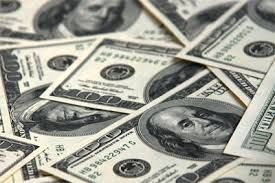BISHKEK (TCA) — The Government of Kyrgyzstan will open a special account for funds coming from the fight against corruption.
According to the Government Decree, signed by Kyrgyz Prime Minister Muhammedkaly Abylgaziev on June 22, the account in the treasury system will be distributed exclusively over decisions of the Government.
The second account will be open to citizens wishing to help the state to pay off its debts. Such a proposal came from the Parliament deputies.
Special account
“The Government intends to open a special account, where funds will come from those who want to help the State,” the Prime Minister said at the Parliament meeting during the discussion of the Government’s report for 2017 on June 14.
Kyrgyzstan began to take loans from 1992, the second year of its independence. By March 31, 2018, the state’s external public debt reached $3.9 billion, of which $1.7 billion is the debt to China. At the end of 2017, the state foreign debt was $4.1 billion, or 53.9% of GDP.
The proposal of the head of the Cabinet caused heated discussions not only among experts and the media, but also in the general public.
The first and the only person to respond to the Government’s appeal was MP Kamchybek Joldoshbayev, who is ready to donate one million soms. However, the general public did not support the Government’s initiative.
Kyrgyzstan’s citizens regularly pay taxes and have the right to expect that the State will rationally dispose of them.
Asking for charity from people
“The State is not a kind of abstract dependent which citizens keep at their own expense for the kindness of their soul. The State, including its management institutions, is the manager to whom citizens gave the most common functional levers for regulating economic activity to obtain in return for their security, order and the most efficient distribution of economic and social benefits,” the Beli Parus newspaper writes.
The state top managers are pathetic about calling for help to the citizens of the country, telling about great foreign debt and little money available, and malicious corrupt officials who had robbed the budget for billions of soms. But ordinary people cannot understand their relation to the state debts and stolen budget money. If the state made ill-considered strategic decisions, it was not clear where budgetary funds were spent, and taxpayers are unlikely to make voluntary donations.
Asking for voluntarily help from the people, Prime Minister Abylgaziev understates the authority of the country at the international level, the Fabula Press newspaper reported. “Which states or international financial institutions will trust the state which asks for charity from its people? Abylgaziev begs from his people instead of feeding them.”
Mired in corruption
Former judge of the Constitutional Chamber of Kyrgyzstan, Clara Sooronkulova, believes that such a proposal indicates the weakness and helplessness of the State. Who will give money to the State which is mired in corruption? If such a charitable foundation were created in another situation, perhaps people donated their money to help the state pay off its debts. But after it was revealed that the high-ranking government officials stole loans and grants, asking to raise money would be ridiculous.
Earlier this year, civic activists put forward an idea that the $1.7 billion state debt to the largest creditor, China, could be paid off by the population, if each inhabitant donates $707.3. But the idea had no supporters.
Meanwhile, the State could increase revenues to the budget if it tries to withdraw business from the shadow economy. Incomes of the shadow economy are increasing in Kyrgyzstan. In 2000, they were 8.5 billion soms, in 2015 – more than a hundred billion, and in 2016 amounted to 116.7 billion soms. According to the National Statistical Committee, there is no unobserved economy in the mining of minerals, but it thrives at the enterprises of manufacturing industry, in construction, transportation, and especially in wholesale and retail trade, and repair of cars.
Highly risky country
Experts of the international group on combating money laundering, the Financial Action Task Force (FATF), want to include Kyrgyzstan in its list of high-risk countries. The FATF identified jurisdictions which have strategic weaknesses in their anti-money laundering and counter terrorist financing (AML/CTF) framework.
According to the State Service for Regulation and Supervision of the Financial Market under the Kyrgyz Government, the FATF claims that the risk-oriented approach to financial transactions is not fully applied in the country. Only commercial banks apply return of assets and compensation for damage.
Besides, Kyrgyzstan has not complied with the FATF requirements to eliminate gaps in legislation. As a result of the assessment of the Eurasian Group on Countering the Legalization of Criminal Incomes (EAG), Kyrgyzstan received a low rating – 13 out of 40 and fell under the EAG enhanced monitoring. The country was given a year to eliminate the shortcomings. Otherwise, Kyrgyzstan can get on the list of high-risk countries. Inclusion in it will negatively affect the reputation of the country, which will entail the application of various financial sanctions.
The EAG is a FATF-style regional body which comprises 9 countries: Belarus, China, Kazakhstan, Kyrgyzstan, India, Russia, Tajikistan, Turkmenistan and Uzbekistan. 15 more states and 18 international and regional organizations have observer status within the EAG.








